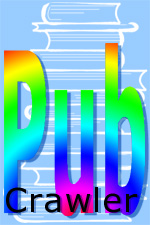Links:
| See an example of what PubCrawler does | |
| Run your GenBank and Medline searches on our server.
Get your results daily as a Web page or by e-mail. |
|
| For professionals:
Install a copy of the PubCrawler program on your own computer (PC/Mac/Unix) |
Details:
PubCrawler searches the NCBI PubMed (Medline) and Entrez (GenBank) databases
daily using search parameters (keywords, author names, etc.) specified
by the user. There is no limit on the number of searches that can
be carried out. Previous search hits are stored and only the newest
PubMed or GenBank records are shown each day. The results are presented
as an HTML Web page, similar to the results of an NCBI PubMed or Entrez
query. This Web page can be located on our computer (the PubCrawler
WWW-Service), on your computer (the stand-alone program), or you can receive
it via e-mail (set this up using the PubCrawler WWW-Service). The Web page
sorts the results into groups of PubMed/GenBank entries that are zero-days-old,
1-day-old, 2-days-old, etc., up to a user-specified age limit.
PubCrawler was developed by Karsten
Hokamp and Ken Wolfe
in the Department
of Genetics, Trinity College Dublin,
Ireland. The public web service has been in use since March 1999.
PubCrawler in the news:
|
Other free alerting services:
PubCrawler looks for matches to text (Medline and GenBank annotation), not sequences, and writes its output as a WWW page. Other "alerting" services scan sequence databases either for text or sequence similarity (BLAST) matches, and report by e-mail:- MyNCBI (allows you save searches and data important to you)
- Swiss-Shop at Expasy (BLAST sequence and keyword searches against SwissProt updates)
- Amedeo (free alert service that searches the MEDLINE database weekly)
- LeadDiscovery's DailyUpdates (breaking publications from PubMed judged to be of importance to the drug development community)

Development of PubCrawler was supported by EMBnet

